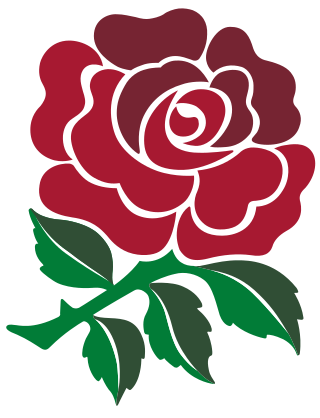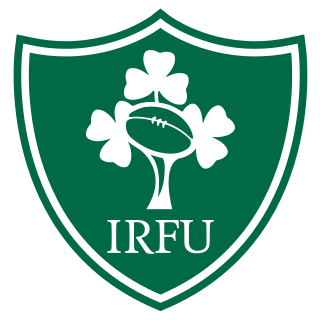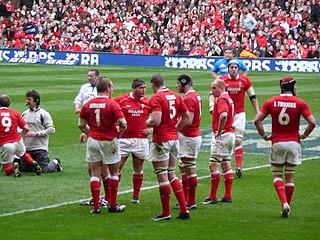
The Six Nations Championship is an annual international men's rugby union competition between the teams of England, France, Ireland, Italy, Scotland and Wales. It is also the oldest sports tournament ever between Home Nations. The championship holders are Ireland, who won the 2024 tournament.

The New Zealand national rugby union team, commonly known as the All Blacks, represents New Zealand in men's international rugby union, which is considered the country's national sport. Famed for their international success, the All Blacks have often been regarded as one of the most successful sports teams in history.

The Rugby Championship, formerly known as the Tri Nations Series (1996–2011), is an international rugby union competition contested annually by Argentina, Australia, New Zealand, and South Africa. These are traditionally the four highest ranked national teams in the Southern Hemisphere; the Six Nations is a similar tournament in the Northern Hemisphere.

The 1999 Rugby World Cup, was the fourth Rugby World Cup, the quadrennial international rugby union championship, the first World Cup to be held in the sport's professional era.

The Calcutta Cup is the trophy awarded to the winner of the rugby match between England and Scotland played annually in the Six Nations Championship. Like the match itself (England–Scotland), the Calcutta Cup is the oldest trophy contested between any two international rugby union teams, pre-dating the Bledisloe Cup by more than half a century. It is also the oldest of several trophies awarded under the umbrella of the Six Nations Championship, which include the Millennium Trophy (England–Ireland), Centenary Quaich (Ireland–Scotland), Giuseppe Garibaldi Trophy (France–Italy), Auld Alliance Trophy (France–Scotland), the Doddie Weir Cup (Scotland–Wales) and the Cuttitta Cup (Italy–Scotland).

The Australia men's national rugby union team, nicknamed the Wallabies, is the representative men's national team in the sport of rugby union for the nation of Australia. The team first played at Sydney in 1899, winning their first test match against the touring British Isles team.

The England men's national rugby union team represents the Rugby Football Union in men's international rugby union. They compete in the annual Six Nations Championship with France, Ireland, Italy, Scotland and Wales. England have won the championship on 29 occasions, winning the Grand Slam 14 times and the Triple Crown 26 times, making them the most successful outright winners in the tournament's history. They are currently the only team from the Northern Hemisphere to win the Rugby World Cup, having won the tournament in 2003, and have been runners-up on three further occasions.

The Wales national rugby union team represents the Welsh Rugby Union in men's international rugby union. Its governing body, the Welsh Rugby Union (WRU), was established in 1881, the same year that Wales played their first international against England. The team plays its home matches at the Millennium Stadium in Cardiff, which replaced Cardiff Arms Park as the national stadium of Wales in 1999.

The Millennium Stadium, known since 2016 as the Principality Stadium for sponsorship reasons, is the national stadium of Wales. Located in Cardiff, it is the home of the Wales national rugby union team and has also held Wales national football team games. Initially built to host the 1999 Rugby World Cup and replacing the National Stadium, it has gone on to host many other large-scale events, such as the Tsunami Relief Cardiff concert, the Super Special Stage of Wales Rally Great Britain, the Speedway Grand Prix of Great Britain and various concerts. It also hosted FA Cup, League Cup and Football League play-off finals while Wembley Stadium was being redeveloped between 2001 and 2006, as well as football matches during the 2012 Summer Olympics.

Twickenham Stadium in Twickenham, in the London Borough of Richmond upon Thames, England, is a rugby union stadium owned by the Rugby Football Union (RFU), English rugby union governing body, which has its headquarters there. The stadium is England's national rugby union stadium and is the venue of the England national rugby union team home matches.

The Ireland national rugby union team is the men's representative national team for the island of Ireland in rugby union. The team represents both the Republic of Ireland and Northern Ireland. Ireland competes in the annual Six Nations Championship and in the Rugby World Cup. Ireland is one of the four unions that make up the British & Irish Lions – players eligible to play for Ireland are also eligible for the Lions.

The Italy national rugby union team represents the Italian Rugby Federation in men's international rugby union. The team is known as gli Azzurri. Savoy blue is the common colour of the national teams representing Italy, as it is the traditional colour of the royal House of Savoy which reigned over the Kingdom of Italy from 1860 to 1946.

The 2006 Six Nations Championship was the seventh series of the rugby union Six Nations Championship to be held since the competition expanded in 2000 to include Italy. Including the previous incarnations as the Home Nations and Five Nations, this was the 112th series of the northern hemisphere rugby union championship. This was the fourth edition sponsored by Royal Bank of Scotland.
The 1975 Five Nations Championship was the forty-sixth series of the rugby union Five Nations Championship. Including the previous incarnations as the Home Nations and Five Nations, this was the eighty-first series of the northern hemisphere rugby union championship. Ten matches were played between 18 January and 15 March. It was contested by England, France, Ireland, Scotland, and Wales. The championship was won by Wales, the team's eighteenth title.

The 2008 Six Nations Championship, known as the 2008 RBS 6 Nations because of sponsorship by the Royal Bank of Scotland, was the ninth series of the rugby union Six Nations Championship, the 114th series of the international championship.
The 1999 Five Nations Championship was the 70th series of the rugby union Five Nations Championship. Including the previous incarnations as the Home Nations and Five Nations, this was the 105th series of the northern hemisphere rugby union championship. Ten matches were played over five weekends from 6 February to 11 April. The tournament was won by Scotland, who beat England on points difference.

The Rugby World Cup is a rugby union tournament held every four years and contested by the men's national teams of the member unions of World Rugby. The Wales national rugby union team has participated in all ten Rugby World Cup tournaments. Up to and including 2015, hosting of the tournament alternated between traditional rugby heartlands in the southern hemisphere and those in Europe. Wales was the primary host in 1999, with Cardiff's Millennium Stadium built to coincide with the event, and the other three tournaments played in Europe have also used venues in Wales to some degree. Cardiff's Millennium Stadium and its predecessor, the Cardiff Arms Park, will have hosted a total 21 matches over a total of four World Cups. This is the largest number of World Cup games hosted by one venue.
The 2013 Six Nations Championship, known as the 2013 RBS 6 Nations because of the tournament's sponsorship by the Royal Bank of Scotland, was the 14th series of the Six Nations Championship, the annual northern hemisphere rugby union championship. It was contested by England, France, Ireland, Italy, Scotland and Wales.
The 2012 Women's Six Nations Championship, also known as the 2012 RBS Women's Six Nations due to the tournament's sponsorship by the Royal Bank of Scotland, was the 11th series of the Women's Six Nations Championship, an annual women's rugby union competition between six European rugby union national teams. Matches were held in February and March 2012, on the same weekends as the men's tournament, if not always the same day.
The history of the Wales national rugby union team from 2005 to present covers a period where the side won four Grand Slams in the Six Nations Championship, as well as another Championship victory. The Grand Slams, in all the tournament matches, were achieved in 2005, 2008, 2012 and 2019. Their other Six Nations Championship, in 2013, was won without achieving a Grand Slam. The country has not enjoyed as much success against the major southern hemisphere opposition of Australia, New Zealand and South Africa. New Zealand have not been defeated by Wales since 1953, and South Africa have only been defeated five times since 2005: a 12–6 victory in 2014, a 27–13 victory in 2016, a 24–22 victory in 2017, a 24–22 victory in Washington DC in 2018 followed by a 20–11 win in Cardiff in 2018. Wales defeated Australia in November 2005, and also in November 2008. Following this, Wales suffered a thirteen-match losing streak to the Wallabies. This ended in 2018, when Wales defeated Australia 9–6.














